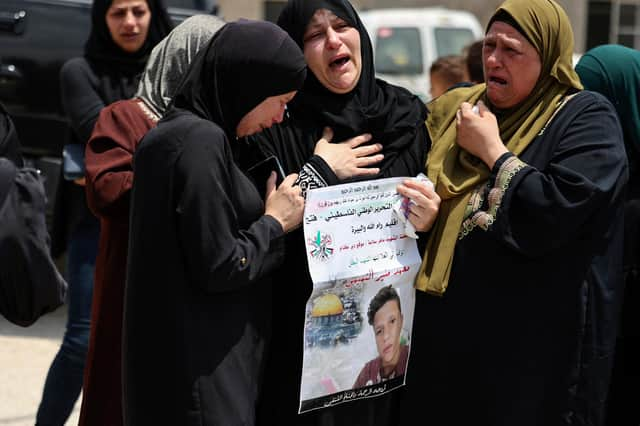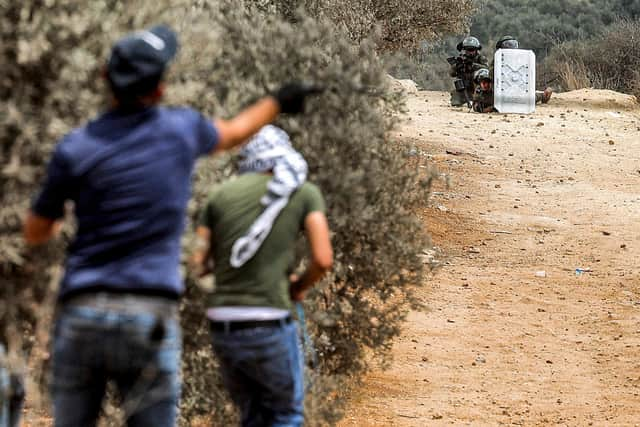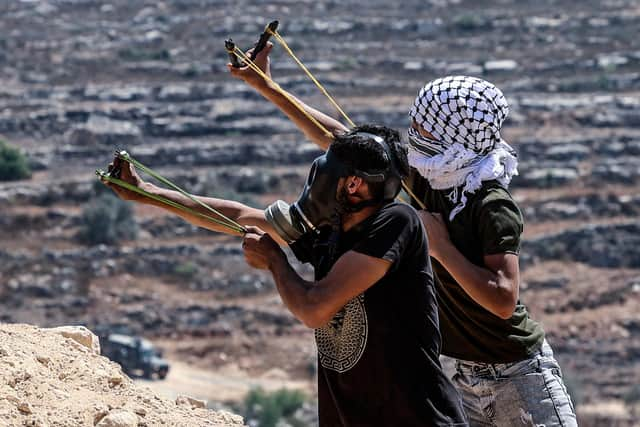Palestinian Lives Matter: Corrupt Israeli Defence Force in West Bank is acting as enforcer of messianic settlers’ Greater Israel project – Ben Lynfield


But the killing was carried out in the service of messianic Jewish settlers who enjoy a symbiotic relationship with the army.
Hemayel's death came as part of a heated uprising by Palestinian residents of the northern West Bank town of Beita against army-protected efforts to establish a new illegal settlement on land overlooking their homes that Israeli watchdog groups say is privately owned Palestinian property.
Advertisement
Hide AdAdvertisement
Hide AdAn IDF spokesman declined to answer if there have been any casualties among soldiers, while five Beita residents have been killed, 559 wounded by rubber bullets and 170 by live fire since May, according to the United Nations. Some 2,299 people suffered from tear gas inhalation, meaning that one out of every five Beita residents has been wounded by the IDF.
It was in May that the settlers seized the top of Sabih Mountain next to Beita and renamed it "Evyatar", in an action they say redeems biblically endowed land and brings closer the coming of the messiah.
Even if the IDF succeeds in crushing the Beita uprising, the town has exposed that much of the IDF's mission in the West Bank has little to do with defending Israel and everything to do with serving as the enforcement arm of the settlers in a joint effort with the government to poach as much Palestinian land as possible.
Under a deal worked out with the government, settlers have for now been evacuated from the hilltop while Israeli authorities try to find a way to retroactively make their action, a war crime under the Fourth Geneva Convention, conform with Israeli law so that they can return.


Hemayel, a promising pupil popular with his classmates, was throwing stones at troops but not from a distance that endangered them, according to his father Said. “They made a decision to execute him,” he said. Six weeks later, the IDF still couldn't offer any account or explanation of the shooting,
Beita’s residents try to march up the hilltop and use stones and petrol bombs and shine lasers in the soldiers’ eyes. The soldiers’ mission is to protect the settler buildings, often with live fire.“The settler and army relationship is so symbiotic that at times it's not clear where one ends and the other begins,” said Yehuda Shaul, a founder of the group Breaking the Silence which consists of soldiers and ex-soldiers critical of the occupation.
Dovish political scientist Menachem Klein, of Bar Ilan University near Tel Aviv, said it was a mistake to view the IDF in the West Bank and the settlers as two separate groupings. “On the ground, the army and settlers are two hands of the same body. The two hands join forces and act in coordination.”
The symbiosis is structural, with each of the settlements having a security coordinator from the settlement who has command power over some of the troops stationed there, according to 14 former officers and soldiers who served throughout the West Bank and shared their experiences with The Scotsman.


Advertisement
Hide AdAdvertisement
Hide AdThe 14, from campaign group Breaking the Silence, wrote in a letter that the settler security coordinator “gave us briefings, sent us to carry out missions, instructed us who was permitted to enter or approach the settlements and told us how to treat local Palestinians”.
In many cases, settler security coordinators also set the rules of engagement, the IDF veterans added. The Israeli human rights group Yesh Din warned in a recent report that this paves the way for the creation of “militias”. The IDF denies that settler security coordinators have command over IDF soldiers.
The IDF's mission in the West Bank does include preventing drive-by shootings, suicide bombings and other Palestinian attacks, and it has to keep Hamas in check, no small tasks.
But it certainly does not view as part of its mission protecting Palestinians from settler violence. At times, troops fire tear gas at the intended victims or, most often, just stand by and watch it unfold.
In area C, the part of the West Bank formally under full Israeli control where Israeli settlements and rural Palestinian villages are located, Israeli military administrators reject 97 per cent of Palestinian applications for building permits while hooking up illegal settlement outposts to water and electricity.
Then, in Kafkaesque fashion, the army demolishes Palestinian homes for being built without permits.
Soldiers’ killings of innocent Palestinians hardly ever result in indictments. By contrast, the conviction rate of Palestinians in army military courts is nearly 100 per cent. And the IDF is not ashamed of this.
In the West Bank, the army joins the settlers in expanding Israel across the hilltops of “Judea and Samaria”, facilitates de facto Israeli annexation and coercively confines the Palestinians to as little territory as possible.
Advertisement
Hide AdAdvertisement
Hide AdTo Israel's credit, it is the only country in the Middle East with genuine freedom of expression (within its pre-1967 borders) and all of these abuses can be criticised, discussed and read about in Haaretz newspaper and other left-wing publications.
It also has a very impressive array of NGOs documenting and trying to combat every aspect of the occupation whether it is the human rights group B'tselem, the settlement watchdog Kerem Navot, or Emek Shaveh, which combats right-wing attempts to use archaeology to displace Palestinians. The list is much longer. But these groups, the real heroes of Israel today, are, in terms of the occupied West Bank, up against the most powerful force in the country: the settler-IDF-government axis.
While it may contain many decent individual soldiers, after 54 years of occupation, its job as the enforcer of the settlers’ Greater Israel project, its troubling instances of apparent disregard for the lives of Palestinians and its absence of real accountability for violations make the IDF in the West Bank a very corrupt institution.
As long as it is not reformed, the IDF constitutes a major obstacle to an eventual two-state peace compromise with the Palestinians.
This article has been edited to make clear the IDF veterans’ claim that settler security coordinators give orders to soldiers is disputed.
A message from the Editor:
Thank you for reading this article. We're more reliant on your support than ever as the shift in consumer habits brought about by coronavirus impacts our advertisers.
If you haven't already, please consider supporting our trusted, fact-checked journalism by taking out a digital subscription.
Comments
Want to join the conversation? Please or to comment on this article.
